#like if it said 1928
Text
i swear to fuck latin class teaching me that technically a vocative noun (ie. a name when someone is calling it) is supposed to be incased in commas is fucking destroying my fanfiction reading pleasure
because i keep seeing things like “Hello Larry, come help with this snapwobble problem”
and all my mind can offer
is that it’s supposed to be “Hello, Larry, come help me with this snapwobble problem.”
#it’s bad enough that i already get periodically stuck just spelling a word (that is already spelled correctly) out in my head over and over#or seeing a sentence with a comma or elipses and reading it normal and then reading it while saying ‘comma’ and ‘dot dot dot’ for them#and whenever i see dates#like years#i have to order the numbers in numerical order and then go through all the possible mathematical combinations to make New Numbers#like if it said 1928#id have 1289 and 1+9+8+2 = 20 and 1 tag 8 and 9*2 both equal 18#and then 18 + 18 = 36#and then 36 +36 = 72#and so on and so forth#also that 9-1=8 so then it’s 828 which is basically 414#then you add 4 and one to get 5 and multiply 5 by the last 4 to get 20 and then 20 times 5 is 100 and 100/10 is 10 and the 9+1 and 8+2#are both equal to 10#and 10 is a really Good Number#and you can split it into 1 and 0 and anything divided bh zero is just… nonexistent#and thats cool#and anyways i do that with like all the dates i see and i am#conversely#rather bad at remembering dates#my story-reading is a /tad/ jerkey and split-up lol#just a tad#rat.txt#math#i guess
2 notes
·
View notes
Text
I have an embarrassing amount of lore for my Twilight oc Minnie. I need some bitches
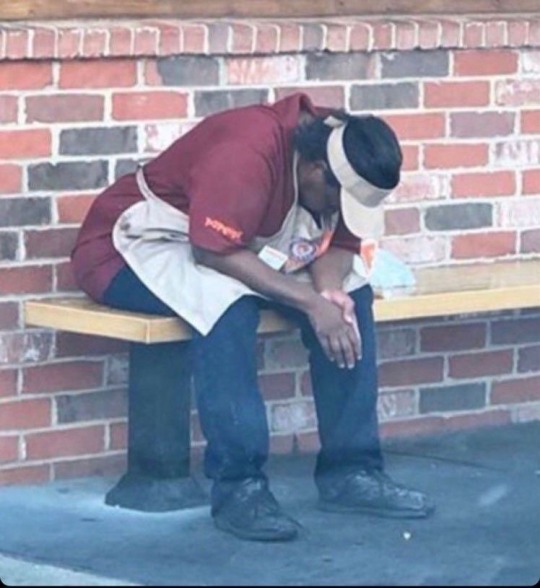
#Slices Speaks#Slices is bitchless#All this lore for a TWILIGHT OC?#I gotta be sedated#I made her a whole timeline#and YES her name is Minnie. it was a placeholder then I got attached#according to google Minnie Mouse was created in 1928#Mine was born in 1906 so technically-#she’s also black#Jasper Confederatie Whitlock is foaming at the mouth#I remember this one time I read a fucking one shot where they said Jasper isn’t racist because he’d like Beyoncé#WHAT?#you could’ve chose to rewrite his backstory or have him actually change but BEYONCÉ?
2 notes
·
View notes
Text
Has anyone noticed that their follower count doesn't go up when bots follow you? Or is that just me?
#like i had 1920 yesterday#then today i have 1923#but 5 bots and 3 real people had followed me since yesterday so it shouldve said 1928#i blocked the 5 bots and it still said 1923#every time i block bots my follower count doesnt change
3 notes
·
View notes
Text
Harry McClintock - The Big Rock Candy Mountains
1928
"The Big Rock Candy Mountains", first recorded and copyrighted by Harry McClintock in 1928, is a country folk song about a hobo's idea of paradise, a modern version of the medieval concept of Cockaigne. McClintock said that he wrote the song in 1895, based on tales from his youth hoboing through the US while working for the railroad as a brakeman. It is catalogued as Roud Folk Song Index No. 6696. Before recording the song, McClintock cleaned it up considerably from the version he sang as a street busker in the 1890s. Originally the song described a child being recruited into hobo life by tales of the "big rock candy mountain".
The song was not popularized until 1939, when it peaked at #1 on Billboard magazine's country music charts. It achieved more widespread popularity in 1949 when a sanitized version intended for children was re-recorded by Burl Ives.
The 2000 film O Brother, Where Art Thou? uses "The Big Rock Candy Mountains" in the opening credits.
The song "Candy Mountain Cave", from Charlie the Unicorn, parodies it to the tune of the "Clarinet Polka".
"The Big Rock Candy Mountains" received a total of 65,4% yes votes!
youtube
800 notes
·
View notes
Note
HALLO!! I had some ideaa, were reader is really really shy and quiet. But when it comes to a certain topic (like space, historic events or something) she gets so excited and chatty. Perhaps with Max?
I've been binge reading your fics lmao I love them!
Note: this is so kind of you to say, thank you! 🤍🫶 hopefully you'll enjoy this one too!
"This is Fred, he will be the one guiding you through the exhibition", one of the team partners greeted you and Max before directing you to follow another man.
"I'm Fred, and we're very happy you decided to come to this exhibition - I know you both really enjoy learning about these things and hopefully we can show a couple more interesting things", he smiled, allowing you to step into the first room.
Even though you preferred to stay on the side lines and would happily stay home whenever Max had some event he couldn't bring you with him, this one caught your eye and accepting the invitation wasn't something your boyfriend had to spend a great deal of time convincing you to do.
"This first room is all about the beggining of the first engine, how it was developed to then accommodate the first car and how it evolved from there - for you, Max, I'm sure you're used to the best technology out there", Fred showed you around, pointing out different facts and even showing you some detailed written notes of calculations and measures.
"This is more up your street, isn't it?", Max said as you payed attention to the writing on the book, knowing it was something you definitely wanted to spend more time on.
You nodded immediately, flashing him a big smile and carrying on with your analysis. You were on the shy side of the spectrum, happily tagging along anywhere but needing to stay quiet or speak briefly since full on interactions would empty your social battery quickly and you'd need days to recharge it back to normal. It wasn't something you did out of rudeness - you always remained polite -, but more in the way you knew your limits and how to protect yourself.
"Next up, we have the space rooms", Fred carried on once you read all of the details you wanted to, "this is a new series of rooms that have been added to the exhibition", he walked you through.
"Here we have some of the notes written and worked on by Max Valier and Friedrich Wilhelm Sander for the rocket car Opel RAK1 in Germany - let me just check on the year here", he looked for it.
"It was 1928 - they did it on the Opel raceway in Rüsselsheim, Germany, and the RAK2 rocket car was at the AVUS speedway in Berlin", you said, knowing that bit of information yourself.
"Oh, I didn't know you knew that - any special interest?", Fred asked as Max smiled, knowing you were about to go on and on about something you enjoyed.
"I have a very particular interest in WWII and as I got older, I always wanted to known how things worked and how they found out about the right way to do things - I'm an engineer because of it, and rocketships always interest me. Their work at Opel was very important in the development of Eugen Sänger's work for the space planes - do you have any of those notebooks? I'd love to look at them", you spoke for the first time since the exhibition started, you and Fred quickly getting into depths of all the topics you loved as Max watched you two interact.
(Thank you for sending this in ✨️)
156 notes
·
View notes
Text
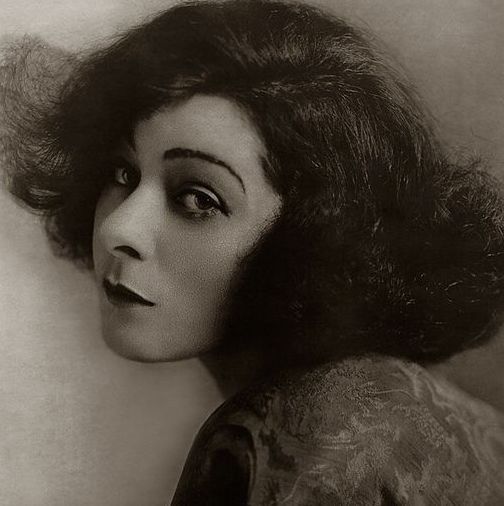
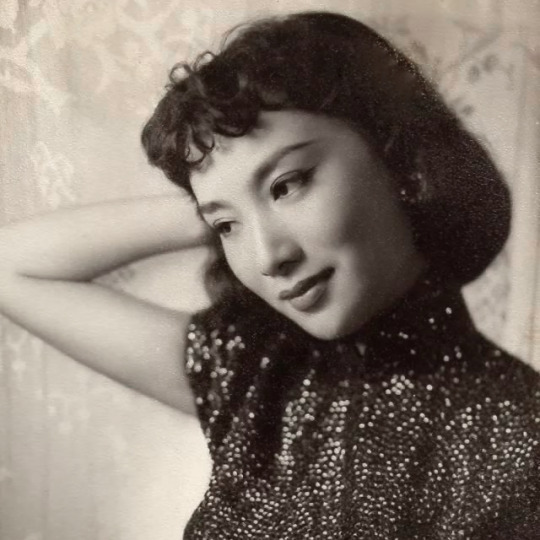
Propaganda
Alla Nazimova (A Doll's House, Camille, Salomé)—She was a proud lesbian, she was a director, she was artsy and experimental, she was instrumental in the rise to fame of Rudolph Valentino, she had the worlds biggest strap on energy
Xia Meng, also known as Hsia Moog or Miranda Yang (Sunrise, Bride Hunter)—For those who are familiar with Hong Kong's early cinema, Xia Meng is THE leading woman of an era, the earliest "silver-screen goddess", "The Great Beauty" and "Audrey Hepburn of the East". Xia Meng starred in 38 films in her 17-year career, and famously had rarely any flops, from her first film at the age of 18 to her last at the age of 35. She was a rare all-round actress in Mandarin-language films, acting, singing, and dancing with an enchanting ease in films of diverse genres, from contemporary drama to period operas. She was regarded as the "crown princess" among the "Three Princesses of the Great Wall", the iconic leading stars of the Great Wall Movie Enterprises, which was Hong Kong's leading left-wing studio in the 1950s-60s. At the time, Hong Kong cinema had only just taken off, but Xia Meng's influence had already spread out to China, Singapore, etc. Overseas Chinese-language magazines and newspapers often featured her on their covers. The famous HK wuxia novelist Jin Yong had such a huge crush on her that he made up a whole fake identity as a nobody-screenwriter to join the Great Wall studio just so he can write scripts for her. He famously said, "No one has really seen how beautiful Xi Shi (one of the renowned Four Beauties of ancient China) is, I think she should be just like Xia Meng to live up to her name." In 1980, she returned to the HK film industry by forming the Bluebird Movie Enterprises. As a producer with a heart for the community, she wanted to make a film on the Vietnam War and the many Vietnam War refugees migrating to Hong Kong. She approached director Ann Hui and produced the debut film Boat People (1982), a globally successful movie and landmark feature for Hong Kong New Wave, which won several awards including the best picture and best director in the second Hong Kong Film Award. Years later, Ann Hui looked back on her collaboration with Xia Meng, "I'm very grateful to her for allowing me to make what is probably the best film I've ever made in my life."
This is round 3 of the tournament. All other polls in this bracket can be found here. Please reblog with further support of your beloved hot sexy vintage woman.
[additional propaganda submitted under the cut.]
Alla Nazimova:

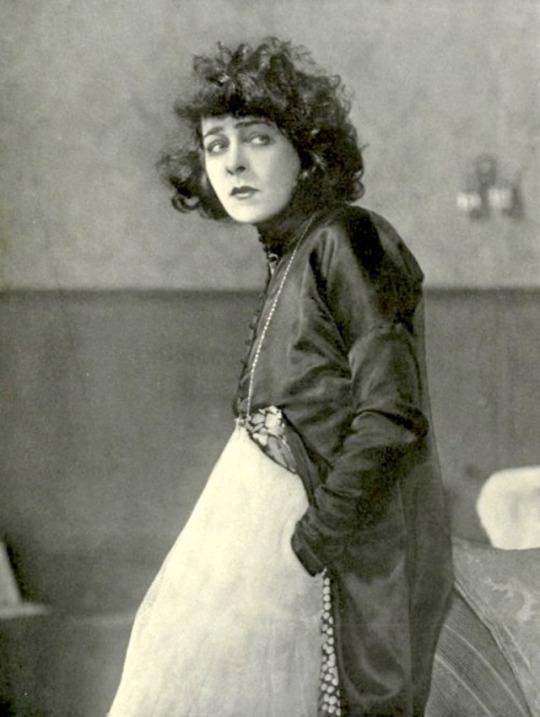
HOT as hell. GAY as hell. TALENTED as hell. Producer, director, writer, actress. A silent era superstar who is credited with having coined the term "sewing circle" as a code-word for gatherings of lesbian and bisexual women. Has been called "the founding mother of Sapphic Hollywood" and was the owner/operator of the Garden of Alla Hotel in West Hollywood, which she bought in 1919 and sold in 1928 after deciding she wanted to go back to Broadway. In addition to starring opposite Valentino in Camille, she also had an affair with BOTH of his wives (Jean Acker and Natacha Rambova). In her day, she was one of the most influential women in the business.
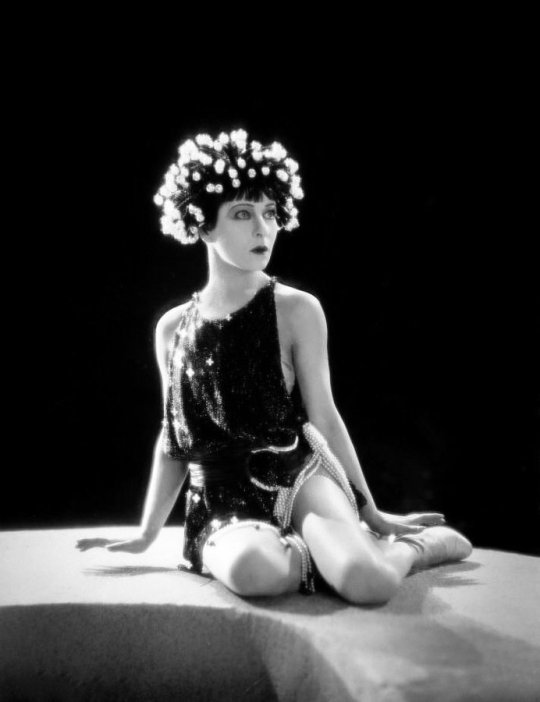
"Nazimova was primarily a star during the silent film era, and her career in film started when she was almost forty. She was openly bisexual, and was engaged in two lavender marriages during her life while she carried on relationships with women (including at least one, and possibly two, of Rudolph Valentino's wives). She was brilliant and an autodidact - when she first moved to the United States from Ukraine, she spoke no English, but taught herself "in about five months" and went on to work as a screenwriter (among other things). Her predilections lay in art film, and she's credited with starring in / producing / directing one of the first American art films, the adaptation of Oscar Wilde's play Salome (1923). She has an elegant and commanding presence in all of her films, and is an absolute sensation to watch in motion."
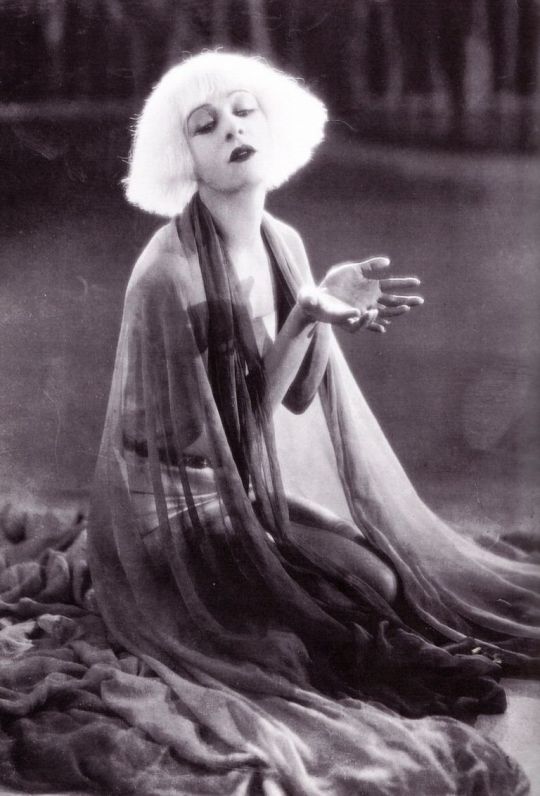
Gif link, another gif link
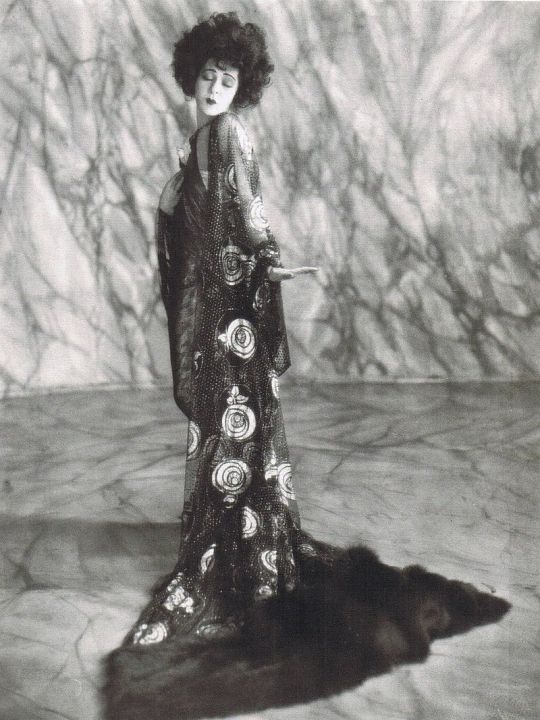
A great actress who also produced a great deal of her films, Nazimova is absolutely mesmerizing to watch. She was also bi and coined the phrase "sewing circle" for sapphic celebrities.
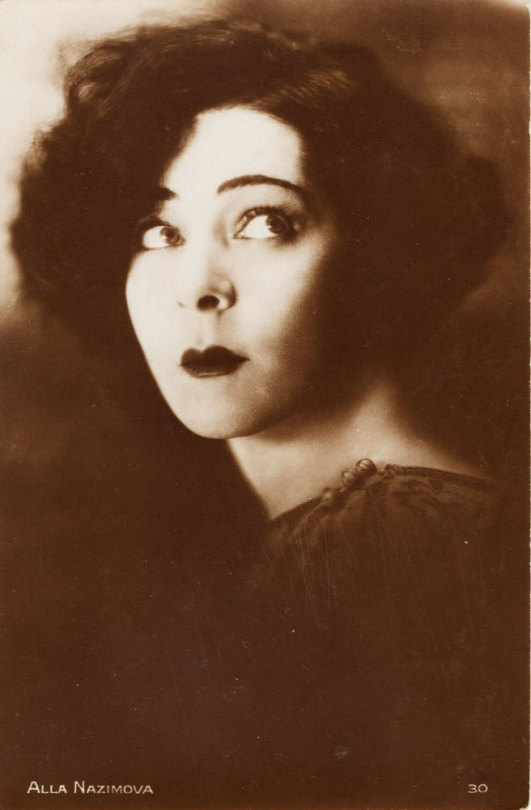


Xia Meng:
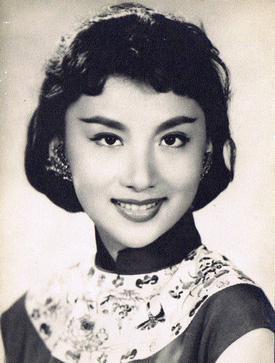
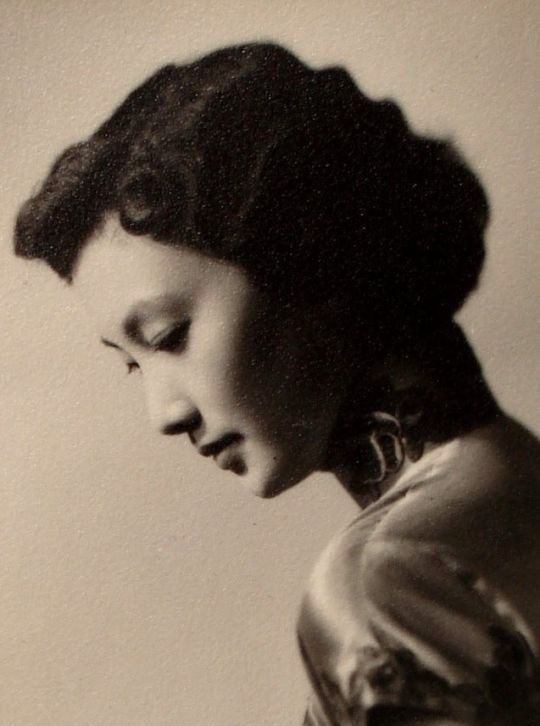
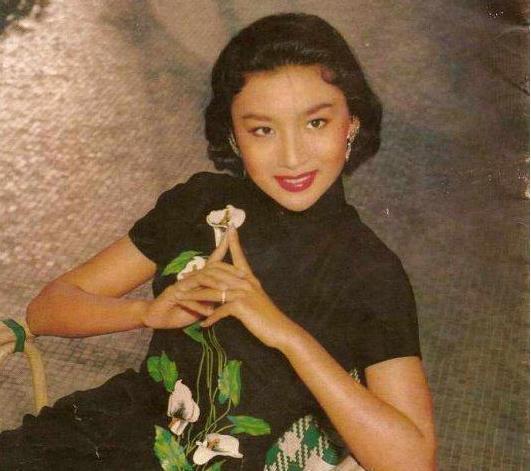
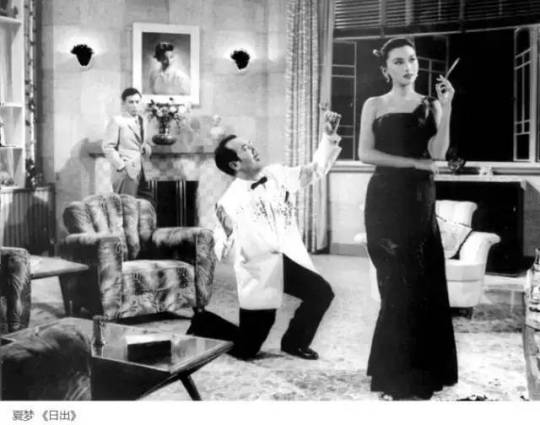

164 notes
·
View notes
Text
I admittedly got into RDR2 five years late and I remember being confused seeing older comments of fans completely dogpiling on Mary Linton (née Gillis - a character who I interpreted much differently than these users did), but assumed maybe people would have grown up a bit since then and understand Mary better. Unfortunately, I still see so many people completely misunderstand and shit on Mary's character and I want to talk about it (this meta will be my opinion AND biased as a Mary defender, but idc)

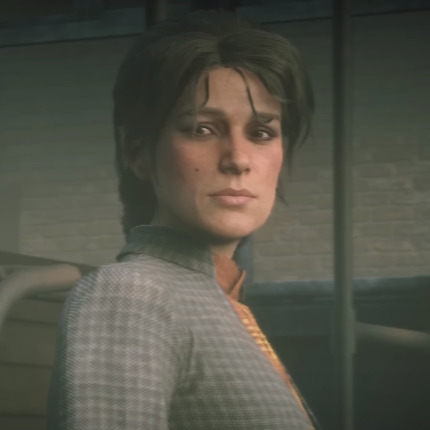
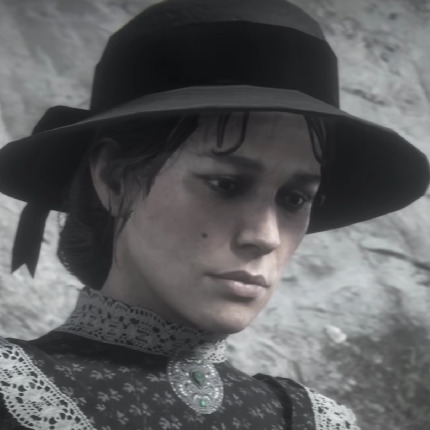
I cannot stand it when people, particularly male fans, call Mary "manipulative" or someone who just "uses Arthur when it's convenient to her" because that just isn't true, and it really shows that a lot of the people who just trash on her have no idea what they are actually talking about.
Labelling her as someone who uses Arthur just for her own personal conveniences makes no sense when you consider the fact that so many other characters, including members of the Van der Linde gang, have also asked Arthur to do things for them, including requests that are much worse than anything Mary could have asked for (you know, like Strauss for example?). Not only that, but if Arthur rejects Mary's help, she doesn't get angry - if anything, she understands why he may be reluctant to help her. If Mary truly only wanted to use Arthur, she wouldn't have shown how grateful she was for his help and how much she truly did miss spending time with him by asking him out on a date to the theatre.
And to those who criticise her for not being able to leave her family sooner: do you... not remember the time period this story is set in? All of RDR2 (1899 - 1907) takes place before women got electoral equality with men (1928) and during the main story's time, women were very much under the control of their husbands - or their fathers if they were not married. A big reason as to why Arthur wasn't able to marry Mary in the first place when they were courting each other was because her father didn't approve of his outlaw lifestyle (also, I am unsure if Mary ever alluded to her marriage with Barry Linton being an arranged one, but I lowkey got that impression - perhaps her father wanted to severe the relationship between Mary and Arthur completely by arranging a marriage for her with another man who was also from a seemingly middle-class background/very much not an outlaw and ensure the relationship between her and Arthur would end).
Even if she had more of her own autonomy, we must remember that Mary is part of an abusive family unit. She often tries to excuse her father's terrible actions even though she knows how awful of a man he has become over the years. She is isolated and is hopping from one temporary shelter to another (Valentine, Saint Denis, etc) - she is a widow, she cannot depend on her father obviously, she cannot depend on her mother since she died, nor could she depend on her brother Jamie since perhaps she thought that she was meant to be the source of dependency as the older sibling. Mary said it herself in her goodbye letter (if Arthur rejects to help her) that she truly had no one else to turn to. Arthur was literally the only other person she could ask help from and even then, it seemed like a last resort after not interacting with each other for many years before her first mission and her being apologetic for taking up his time.
Mary holds a lot of regret and remorse for how things ended and it is clear she still thinks about what could have been between her and Arthur. When she fully accepts that she doesn't want to continue living such a miserable life because of her family, she makes a big leap in suggesting she and Arthur run away together, a parallel to Arthur's proposal years before, showing that she has grown and no longer wants to accept a life she feels trapped in.
People who criticise Mary for not being able to leave her family + the life she has always known behind should also consider how Arthur is the exact same. He is as much of a victim of this unfair circumstance as Mary is, but we have seen how he couldn't leave the gang life behind. It was what he died for, after all. He failed to meet the promise he made to Mary that he would run away with her after getting some money and ensuring the gang members' safety - which technically isn't his fault since this was pre-Guarma, but Mary couldn't have known about that. To her, he kept making promises he couldn't keep/getting dragged into violent crime life and she couldn't bear to continue having false hope anymore.
It's a shame that Mary has been given such a bad rap by certain fans who have mischaracterised her. Her story is a sad one and so is her love story with Arthur. I will always love and defend Mary (+ the other main female characters of RDR2) and I truly wonder how different her and Arthur's lives would have been if they managed to run away and get married (TB ideally excluded) and how happy they would have been.
#ranna word dumping#i love them#in my head arthur never got tb and he ran away with mary#they live happily together#they make me so sad#arthur oh arthur!! :(#rdr2#red dead redemption 2#red dead redemption#rdr#arthur morgan#rdr2 arthur morgan#arthur morgan rdr2#rdr2 mary linton#mary linton#mary gillis#john marston#abigail roberts#dutch van der linde#hosea matthews#meta#rdr2 meta#meta post#infodump#info dumping#hot take
148 notes
·
View notes
Text

I have never seen a house that makes me feel like I'm losing my mind. It's a conversion, the former headquarters of an Electrical Workers Union local. The 1928 building is in Sheffield, AL, has 4bds, 4ba, $444K. I've never heard of the town, but the description says it's "The Hit Recording Capitol of the World," and near legendary and famed recording studios.

To begin with, the home is located on a fork in the road.


Is it the photography? The place just seems spacey. Of course, they painted it all in gray. I just feel like screaming, I can't take gray houses anymore. Are the floors cement?

If I didn't see the little bits of color, I'd think these photos were black & white. This kitchen is huge.


There's a large stainless industrial sink. This kitchen was probably here and they painted the old oak cabinets black.

Trippy double halls to the bedrooms. Notice the way the floorboards go.
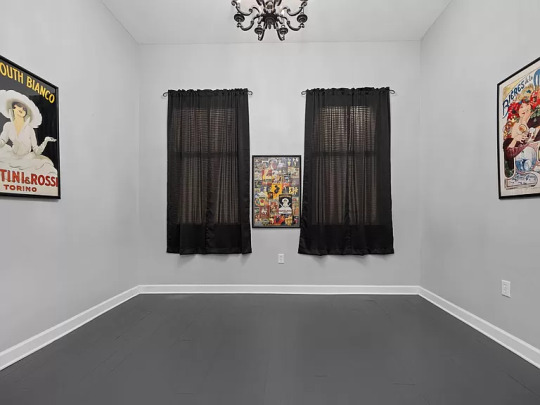
The bedrooms are boxy and plain.

They've got original doors w/windows.
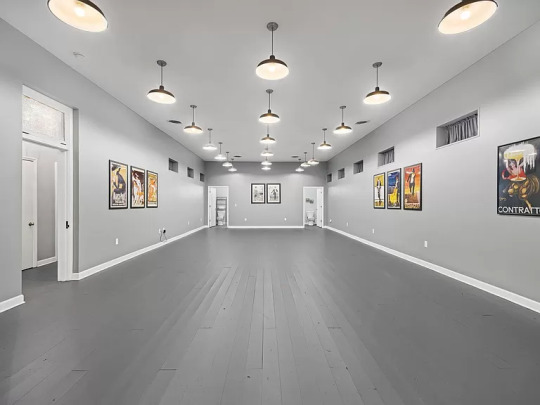
This was the large meeting/event room.


Twin baths.


When the description said spiral stairs, I didn't expect them to be down in the basement.

There's an industrial sink and a toilet down here.

Part of the 1.18 acre lot is fenced to make a yard.

It looks like there used to be another building on the property.

Looks like they made a driveway going to that area, for parking.
https://www.zillow.com/homedetails/3325-N-Jackson-Hwy-Sheffield-AL-35660/343977469_zpid/
142 notes
·
View notes
Note
Hi. I want to preface this by mentioning I am a non Jewish supporter of Israel and of the Jewish people, but I have some serious questions that really bother me and make me rethink my position.
Reading up on the beginning of the Zionist movement and its leaders, I cannot help but think, how can they simply ignore that there are already people there, or that said people would be alright with becoming a minority? Did they really think Arabs and arabised people living there would just be alright with it?
I do believe that Jews are indigenous to the land and that it’s only just that they have their homeland back, but I think the way they went about it was wrong. It’s not the fault of the people living there that Romans exiled them after all. Some Zionists leaders admitted that the only way to establish a state was against the will of the native population and that some ethnic cleansing is necessary to achieve it.
I want to support Israel but I’m very uncomfortable with the idea that many innocent people who lived there for generations were kicked out after the lands were bought by Zionists, or ended up ethnically cleansed in the civil war even if they didn’t participate in the hostilities. It feels morally inconsistent to me to just ignore this or brush it aside.
What is your view on all of this?
My view is that it's fine to believe exactly what you said - "the Jews are indigenous, it's only just that they have their homeland back, but the way they went about it was wrong." Nothing in that construction justifies hatred or violence against Jews or Israelis, nor does it prevent building a better future for Palestinians.
Israel exists. It houses half the world's Jewish population and a majority of all Jewish children, mostly descendants of refugees from obliterated communities in the MENA or Europe (more the former). Those political realities matter far more than an essay debate published in 1928. You may have already encountered people who try to relitigate the Civil War by pointing out that Abraham Lincoln unlawfully suspended habeas corpus and didn't even really like black people anyway, so instead of a gruesome and devastating war led by a morally compromised man it would have been better to allow the South to gradually phase out slavery on its own, that it should have happened some other way. Well, it DIDN'T happen some other way, it happened and people well into the 21st century need to move on with life. If anyone in the world had an excuse to cling to bitterness forever, it would be the Jews of Israel vis-a-vis Jordan and Egypt and Saudi Arabia, Poland and Russia and Germany. So why are the Jews of Israel able to move on with having relationships with all those countries that persecuted and destroyed them? And if they can do it, shouldn't casual observers half a world away do it?
By all means, read up on early Zionist history, see what the ideas were and how they had to change when exposed to real events (and also see how they were specifically opposed to population removal). Some, like Martin Buber, urged a binational state formed cooperatively with Arabs. Ze'ev Jabotinsky warned that Arabs would never accept large numbers of Jews as their equals and that promises of shared wealth were a fantasy, therefore Jews would need to demonstrate military power and win respect and negotiations that way. Albert Einstein had initially hoped for a binational state, but once history happened the way it did, he accepted - and loved - the Israel that he got.
I also think you should look a bit more deeply into just why so many people departed Palestine in 1948, and just how many generations had passed since their own ancestors had in turn immigrated there.
Whatever you may read about the 1920s, or 1940s, you will find nothing that justifies hatred, harassment, violence, or genocide against Jewish people at any place or time, including Israel today. If you truly are a supporter of the Jewish people as you claim to be - and we would be happy to have you - by all means look at the true toll of history and keep speaking up for our protection and our lives.
#israel#palestine#zionism#palestinians#martin buber#albert einstein#ze'ev jabotinsky#ottoman empire#nakba
78 notes
·
View notes
Text
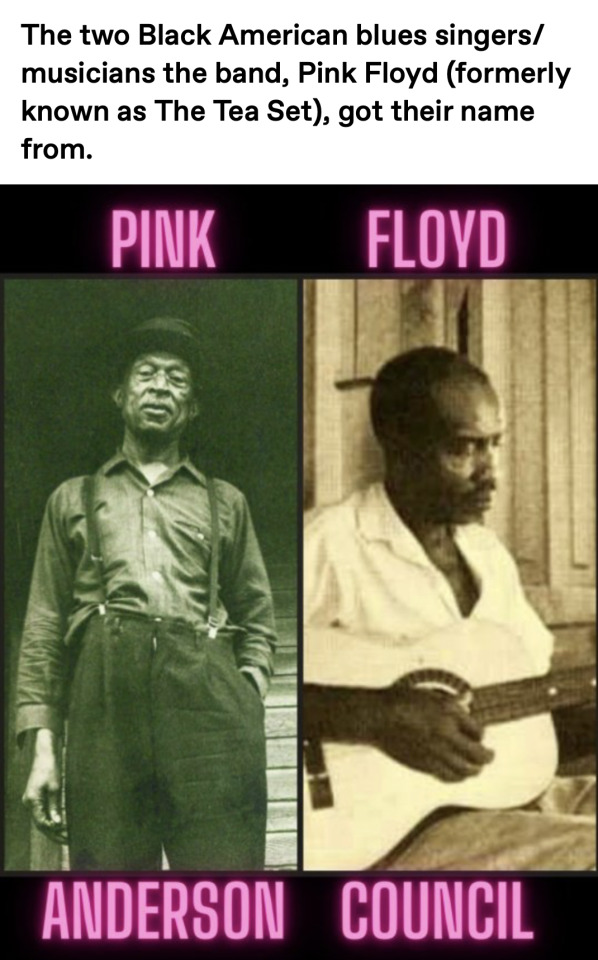
Pink Anderson (1900-1974)
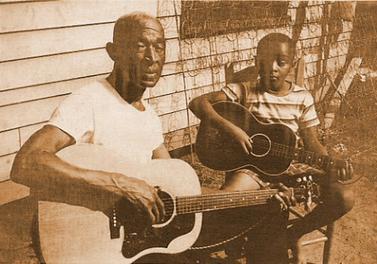
Pink Anderson was a historic figure whose music included Piedmont-style blues, folk music, ragtime, and traditional ballads. He was born in South Carolina and early on sang in the streets for pennies. He was self-taught as a guitarist and toured throughout the Southeast with a variety of medicine shows (including Dr. William R. Kerr's "cure all medicine") during 1915-1945, picking up work wherever he could. He was employed not only as a musician and a singer but as a dancer and comedian.
Anderson recorded four titles in 1928 but did not make another record until Harlem Street Spirituals in 1950 for Riverside. At that time he recorded such traditional folk material as “John Henry,’ ‘The Ship Titanic,” and “Wreck of the Old 97.” He continued to work at parties, street fairs, and medicine shows during the first half of the 1950s before retiring for a time due to ill health. But in 1961, the Bluesville label recorded three albums of unaccompanied performances by Anderson, documenting him in Spartanburg, South Carolina. The titles of the three records, Carolina Blues Man, Medicine Show Man, and Ballad & Folksinger, vol. 3, sum up Pink Anderson’s life well and are a large slice of the repertoire that he had performed during the previous 35 years.
Pink Anderson stayed active on a part-time basis up until the time of his death in 1974. His music represents the Carolina blues, and the tradition of the constantly traveling folk singer.
Source
Floyd Council (1911-1976)
Floyd Council was a blues singer and guitar slinger who played in the East Coast / Piedmont style. He didn’t record solo often, but he’s still said to have recorded 27 songs, many backing up the legendary Blind Boy Fuller.
Born in North Carolina, Floyd began his musical career on the streets of Chapel Hill in the 1920s, performing with two brothers, Leo and Thomas Strowd as “The Chapel Hillbillies.” He recorded twice for ARC at sessions with Blind Boy Fuller in the mid-thirties, all examples of the Piedmont style. He was sometimes promoted as ‘Dipper Boy Council’, and ‘The Devil’s Daddy-in-Law,’ but these were likely the invention of record companies, not genuine nicknames.
Council suffered a stroke in the late 1960s which partially paralyzed his throat muscles and slowed his motor skills, but did not significantly damage his cognitive abilities. Folklorist Peter B. Lowry attempted to record him one afternoon in 1970, but he never regained his singing or playing abilities. Accounts say that he remained “quite sharp in mind.” Council died in 1976 of a heart attack, after moving to Sanford, North Carolina.
Source
Pink Floyd

Pink Anderson and Floyd Council were both featured on a Blind Boy Fuller album called Country Blues: 1935-1940. The sleeve of that album caught the eye of Syd Barrett, the frontman for London band, The Tea Set. Barrett changed the band's name to Pink Floyd, and the rest is history.
Source
#pink anderson#floyd council#blind boy fuller#syd barrett#pink floyd#piedmont blues#black american history#music history#thechanelmuse trivia
305 notes
·
View notes
Text
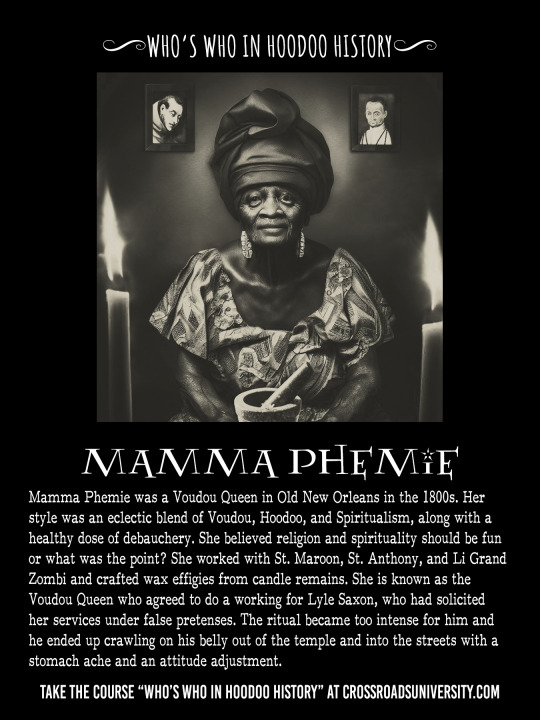
Who's Who in Hoodoo History: Mamma Phemie
Lyle Saxon said he’d always wanted to attend a Voudou ceremony and witness firsthand the sacred rites, but he’d never had the chance. Then, one day—under false pretenses—he got the opportunity.
Saxon had known an enslaved Congo man named Robert for years because Robert had worked for Saxon’s closest friends. In a happenchance meeting, Saxon told Robert some cockamamie story about being heartbroken because a rival stole his girlfriend. He said he wanted revenge on his enemy but was afraid to do anything himself. Of course, Robert took the bait and told Saxon he would take him to a Voudou woman to get it taken care of. So, that’s what they did. Robert took Saxon to see Mamma Phemie.
Mamma Phemie took Saxon through a variety of rituals that involved uncrossing. She had him unbuttoning, unclothing, and basically stripping down to nothing but a loose white robe wrapped around his body. She then prepared a parterre-type altar on the floor, characteristic of 19th-century hoodoo and Voudou. She recited a litany of Catholic prayers, and she experienced possession. Her style was an eclectic blend of Voudou, hoodoo, and spiritualism, along with a healthy dose of debauchery, if Saxon’s description is accurate.
To fix Saxon’s problem, Mamma Phemie said she would petition St. Maroon and Li Grand Zombi (the serpent god). To that end, she fashioned a poppet to represent Saxon’s rival out of black candle wax. After convincing him to cut himself so that she could have a blood offering to smear on the wax, she placed the effigy near the fire where the gumbo cooked in the center of the room. As the wax melted, Mamma Phemie began praying to Jesus, Mary, and Joseph. Then she recited the Act of Contrition. Suddenly, she stopped and yelled out: “Maroon!”
Her congregation followed suit, repeating “Maroon!” over and over again. Finally, one of her assistants brought to the parterre a statue of St. Anthony. As he set it down on the altar cloth next to Mamma Phemie, he said, “Done set de table, St. Maroon . . . now what yo’ goin’ to do?” Immediately the congregation broke out into the chant:
W’at yo’ goin’ to do? Oh, w’at yo’ goin’ to do?
Oh, Maroon, oh St. Maroon,
W’at yo’ goin’ to do?
According to Saxon, “there was no response from the sad-faced saint” (Saxon 1928, 317). Mamma Phemie’s attempt to summon the spirit intensified. She rose to her feet, assisted by a young girl whom Saxon dubbed “the mulatto girl,” and exclaimed: “Yo’ answer me, Maroon! What yo’ goin’ to do?”
Mamma Phemie stomped her foot and spat wine on the statue. In traditional New Orleans Voudou, this is more accurately described as spraying the image with wine to wake up the spirit. This is done by taking a sip of liquid—usually alcohol of some sort—and spraying the liquid out in a fine mist with the mouth. As Saxon didn’t know what he was looking at and wrote from an outsider’s perspective, the behavior sounds rude and vile. But it is not when explained in the appropriate cultural and religious context. This is done to bless objects, people, and spaces to prepare them for ritual activity.
Saxon observed Mamma Phemie go into a frenzy and ultimately into what he thought was an epileptic fit. Again, he was watching as an outsider who came under false pretenses with many preconceived ideas about the nature of Voudou, and he got it wrong. Of course, I was not there as a doctor who could determine whether she actually experienced an epileptic fit. I can say that if you have ever witnessed possession in the context of Voudou, it can look like an epileptic fit to the untrained, inexperienced eye. When the spirits are called down, those present at the ceremony may offer their bodies as “horses” for the spirits to “ride.” Mamma Phemie had been ridden by St. Maroon, evidenced by the exclamations of her congregants, “She done possess! She got ’er way! St. Maroon done answer ’er!” Her assistant added, “De sperrit done come strong on her!” (Saxon 1928, 318).
After Mamma Phemie came to, bowls of gumbo were passed out to congregants. Saxon was offered gumbo but didn’t want to eat it because he saw what he thought was a snake as one of the ingredients. Despite his initial revulsion, he forced himself to take a sip and immediately became sick to his stomach. He continued to watch the ceremony as more possessions began to take place. His anxiety mounted. He clearly did not understand what was going on. He described what he saw in sexual terms, noting how participants were scantily dressed, and “Mamma Phemie was shaking her breasts in rhythm to the drum” (Saxon 1928, 318).
Suddenly, she stood in the middle of the room and shouted: “Zombi!” Saxon then described men and women dropping to the floor writhing and moaning. This is an accurate description of people falling to the floor possessed by Li Grand Zombi. Li Grand Zombi is the primary serpent deity of New Orleans Voudou. The term can refer to the family of serpents in the New Orleans Voudou pantheon, as well. When folks are possessed by Zombi, they will writhe on the floor like a snake and hiss.
After a time, Saxon was given a gris gris designed to remedy his fake problem. “They handed me things that had been prepared for me,” Saxon reported. “A small bag containing ashes, hairs from a white horse’s tail, salt and pepper, and some crushed dried leaves; a box containing pecans which had been drilled with holes and in which feathers had been inserted; a bundle of feathers, wound around with dried grass” (Saxon 1928, 318).
Saxon was told to take the items he had been given and throw them one at a time in the path of his enemy. The feather bundle was to be put inside his rival’s pillow, while the pecans should be placed at his front door. When he next saw his enemy, he was told to throw some salt behind him as he left, which is believed to keep an unwanted person from returning. He was given an orange from St. Maroon’s altar to eat to provide him with strength. “It could not fail me now, for St. Maroon had blessed it. Had I not seen this miracle?” (Saxon 1928, 319).
Through this experience—one that he had the privilege of attending though doing so through deceptive means—Saxon maintained a special level of arrogance. His description of the ceremony moved from sexual to animalistic. He described attempted sexual assault, men biting women, and women being hurled halfway across the room. He said people were crashing against him in the dark, and wine was poured on him.
It wasn’t long before he ran like a little bitch out of the ceremony, sick to his stomach and scared to death. As he crawled on the floor toward the door, he reached desperately for his clothes and was spotted. Robert asked him if he was okay. All Saxon could do was a motion to let him pass.
“Out! I’m going out! Get out of the way!” he exclaimed.
One of the attendants standing guard outside took him by the arm and escorted him off the property, down an alley, and finally through a gate.
Saxon was so sick all he could do was lean against a lamppost. “Finally, the spasm of nausea passed, and I stagger along the dim streets, back toward a sane world which tells me that Voodoo no longer exists—if it ever existed!” (Saxon 1928, 322).
*Excerpted from Witch Queens, Voodoo Spirits, and Hoodoo Saints: A Guide to Magickal New Orleans
Explore the course, Who's Who in Hoodoo History to learn the stories of the OGs of Hoodoo. https://www.crossroadsuniversity.com/courses/who-s-who-in-hoodoo-history
235 notes
·
View notes
Text
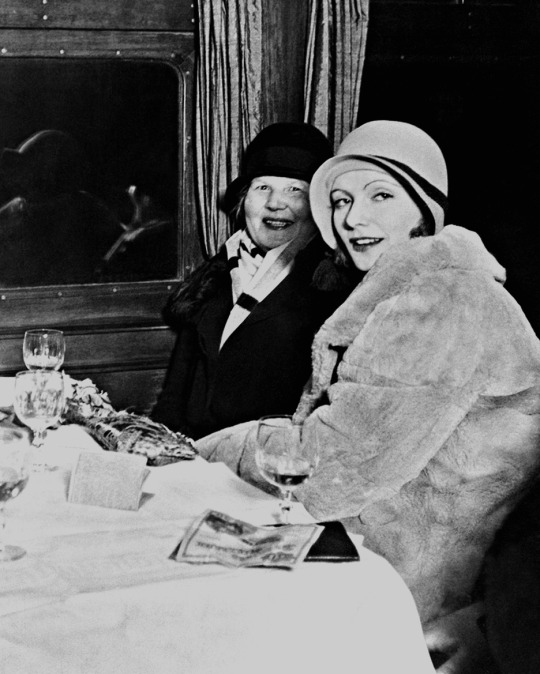
Greta Garbo and her mother in Sweden, 1928.
Despite the distance separating them, Anna kept in close touch with Greta, who had gone to the USA in 1925. They wrote letters to one another. Anna cut out articles that mentioned Greta in the Swedish press and sent them to Hollywood. And Greta sent home cuttings from American papers and photographs she got from MGM.
A lady journalist from Vecko-Journalen (a Swedish woman's weekly) managed to call on Anna Gustafsson in her new flat in the autumn of 1928:
“There was a framed photograph of her husband, who had died young. And there was a photo, too, of Alva [Garbo's sister], who died in 1926. But there was no picture of Greta, her daughter…”
“I've got one here,” said Anna Gustafsson, holding up a locket round her neck with a photograph of Greta, a present from her daughter in Hollywood.
“And I've got more pictures in here,” added the proud mother, pulling out a desk drawer stuffed with piles of stills that Garbo had sent home from her films. She did not dare put them on display – “Greta wouldn't like it…” […]
“Yes, I do go and see Greta in the films. I went to the premiere of Anna Karenina. As someone who knows Greta very well, I could tell she was giving her utmost.”
“So you were pleased with your daughter then, Mrs. Gustafsson?”
“Yes, of course, I'm pleased. Mind you, they didn't need to do all that kissing…”
Conversations with Greta Garbo by Sven Broman
66 notes
·
View notes
Text
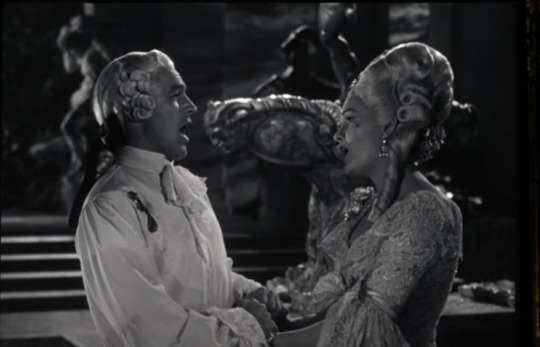
man I really tried to like The Dancing Cavalier (1928) but the plot makes no sense. why would a modern day guy stay with a rich girl during THE FRENCH REVOLUTION. then again, someone once said that movie musicals were mostly spectacle at that time. people just wanted to hear people talk and sing after living through silent cinema that plot didn't matter.
at the very least, it led me down a rabbit hole to some juicy behind the scenes drama between a silent actor and her ghost singer. oh my god.
86 notes
·
View notes
Text
Just for a Moment, part i

Tom Bennett has a habit of climbing through her bedroom window whenever he's in trouble // Main Masterlist
Tom Bennett x OFC
Warnings: 18+, mentions of war and death, friends to lovers, angst, fluff, eventual smut
Words: 3800
A/n: Me? Starting another series to avoid updating ongoing fics? No wayyyy. This is going to be a 4 part mini series and their song is When the Sun Hits by Slowdive, just so you know. Also available to read on AO3.

Tom Bennett had always had a talent for getting under people’s skin.
Kitty knew it when they were kids, when they’d run around the streets of Longsight and the alleyways behind Slade Grove. He would rile anyone up, regardless if they were older or bigger than him. He didn’t even do it for a reason, he just liked to get a raise out of people.
He used to tease her too, for all sorts of stupid reasons, because she was a year younger than him, because her mother used to dress her in shirts and shorts that used to belong to her older brothers, because when they’d buy bags of Yorkshire mix from the shop, she would only eat the red ones. Every Sunday after Church, they’d sit in the park or on the front step of the Bennetts’ house, and Tom would pick out every sweet he knew she liked, and keep the rest for himself.
When Tom was eleven he moved to the big school, where Kitty’s brothers all went, Eddie, Art and Stevie. Eddie was a prefect. He used to come home with all sorts of stories of Tom Bennett, ‘from over the road’. Tom talked back to his teachers, disrupted assemblies, picked fights with other kids, every offence Kitty’s mind could imagine.
It only got worse when his mam died.
Thursday 12th July, 1928
Kitty had never been to a funeral before. She had a new dress and a black overcoat for the occasion. It was cold in the church graveyard, overcast and windy. Mam had held her hand so tightly she wondered if she’d ever get it back.
The Bennetts stood together, on the other side of the grave. Lois’ hair was braided into a messy plait that stuck out on one side, the ribbon at the end tied into a knot rather than a bow. She was trying to hold her father’s shoulder as he cried, but she couldn’t quite reach. Tom stood a little further away from his father. His hair was messy, his knees scabbed and bruised, his shirt skewed and the buttons done in the wrong places.
Kitty kept her eyes on him, all through the service, the burial and the wake back at number 27. Tom didn’t cry once.
That night, when she should have been asleep, she lay awake in her bed, listening to her brothers whispering and in the next room as they always did. Sometimes she felt sad to be left out of their antics, but tonight she was glad to be on her own, in her little box room at the front of the house.
Until she heard a tapping on the window.
She froze between her sheets. Was it too late for it to have been a bird?
And then it came again, tap, tap, tap.
With a determined little huff, she rose from the bed, smoothed her hands down the front of her nightgown and drew back the curtains.
“Tom?” she whispered.
He grinned when he saw her, perched on the windowsill behind the glass.
Kitty raised the window and before she could invite him in he was crawling through it.
“What are you doing?” she hissed.
Tom shrugged and went to sit on the edge of her bed. He glanced around the room, at the little shelf of books, dolls and small wooden animals, the black overcoat hung on the back of the door and the drawings stuck to the wardrobe. He’d been in the Wheelans’ kitchen before, but he’d never been allowed upstairs.
“Couldn’t sleep,” he said, far too loudly for Kitty’s liking.
She pressed a firm finger against his lips. She held her breath, waiting for one of the lads to notice, but they kept on chatting– whatever it was teenage boys chatted about.
“Keep your voice down,” she said.
Tom smiled against her finger and made a cross over his heart.
She sat beside him, swaying her legs while she tried to think of something to say.
Tom reached for a book on her bedside table and flicked through the pages. When he was bored of that, he grabbed her teddy. He tossed it about in his hands and ran his hands over the ancient and matted fur. It had been Eddie’s, back in the day. Every single one of her brothers had owned it before her.
“I don’t like seeing my dad cry,” Tom said.
Kitty frowned. “Why not?”
“I just don’t like it. He’s always been a bit…”
Dad had often mentioned the case of Douglas Bennett. They had fought in the same regiment in 1914. When Micheal Wheelan came back from war, he returned as a self-proclaimed hero. His boys loved to hear his stories and take turns wearing his medals. Douglas Bennett had returned to Manchester a far more troubled kind of man.
“And with mum he–” but he stopped himself with an irritated grunt. “Can I stay here?”
“What?”
“Not forever, I just… can I sit here, just for a moment?”
Kitty took the teddy from him and placed her hand firmly in his. “That’s what we’re doing, isn’t it?”
From then on, Tom made quite a habit of appearing at the window and hiding in her room whenever he was in trouble.

Saturday 2nd September, 1939
Being up and out before the boys are awake is a strange feeling, it’s the only time the house is so quiet.
It’s just before dawn. The sky is a hazy shade of dark blue but an orange glow is starting to appear over the rooftops. Mr Gregory wants her in the shop early to help with a delivery.
Something draws her eyes from her black leather shoes on the pavement, up to the end of the street. A figure makes his way down Slade Grove. She recognises the sway of his shoulders and the end of a lit cigarette in his mouth.
“Alright, pretty Kitty?” Tom says when they’re in earshot of each other, taking the cigarette between his fingers. “What are you doing up so late?”
“It’s early,” she says. He’s in a jacket and slacks, and he has a dazed sort of look in his eyes. She can guess where he’s been but it doesn’t stop her from asking. “What have you been up to?”
“Don’t give me that look,” he says, taking another drag. He tilts his chin up and exhales the smoke above their heads through pouted lips. “Just been down the pub, nothing scandalous.”
A likely story. She’s seen the police knocking on their front door twice in four weeks.
“How’s your job in the shop going?” he asks.
It was supposed to be temporary, a little money to make ends meet after dad got laid off from the factory. Six months later and she’s still there.
“Grand,” she says.
“Can you do me mates rates on a packet of Marlboros?”
“Yeah, if you promise to actually buy them.”
He clutches his chest and his face lights up in an ironic expression. “Of course, what sort of man do you take me for?”
The sort who used to sell cigarettes in the schoolyard— God knows how he got his hands on them in the first place. At that age he could talk himself out of anything. That’s what makes Tom Bennett every parent’s worst nightmare, he’s a troublemaker with pretty blue eyes and an infectiously charming smile.
“I should get going,” she says, taking another step until Tom moves in front of her. Her eyes meet with the collar of his jacket and the hollow of his throat. She can smell the musk of the pub on him, the cigarette smoke and the faded scent of his aftershave.
She looks up to his face and his expression has changed, not quite smiling but amused, smug and somewhat severe.
“What?” she says impatiently.
“Nothing,” he says, unphased, “have a good shift.”
The morning drags on at a gruelling pace. Mr Gregory’s getting on a bit now so Kitty has to do a lot of the heavy lifting, piling boxes into the storage room round the back, going through the stock in the shop, filling the shelves, flattening the boxes and bringing them to the bins outside. It feels like hours of work, but when she looks at the clock it’s not even 9. Eight hours until closing. Mr and Mrs Gregory live above the shop, so at least she gets a steady supply of tea, toast and bits of carrot cake.
By the afternoon she feels her eyes start to close. The morning rush is over now and business will dwindle for the rest of the day. She tries to stay awake, fanning herself with her blouse and nibbling on little mouthfuls of cake.
The bell above the door rings. She straightens her spine and smooths down her apron, ready to put on her best customer service voice, only for Tom Bennett to swagger in through the door.
He’s changed his clothes and donned a blue jacket instead of the earthy green she had seen him in earlier.
“Did you get enough sleep?” Kitty asks at the heavy look under his eyes.
He grins it off. “Packet of Marlboros please, Miss Wheelan.”
She fetches them from the cabinet behind the counter and places the packet in front of him. His aftershave smells a little stronger now. “Anything else?”
He drums his fingers against the counter, looking around innocently at the array of chocolate bars and the jars of sweets behind her.
“I’ll have a bag of Yorkshire mix,” he says.
She takes the jar down from the shelf. She can hear him breathing steadily through his nose as she scoops the sweets into a paper bag. When she turns back around he’s watching her.
“Nine pence,” she says, swallowing down a nervous feeling in her throat.
Tom counts through some change from his pocket and drops the coins into her hands, a sixpence and a thruppence. His fingertips brush over her palms and his knuckles are scabbed over. She dreads to think why.
“Nice one,” he says once she puts the payment through the till. “What do you make of this stuff going on in Poland then?” he says, popping a pear drop into his mouth.
She’s only been reading the headlines of the papers when she stocks them in the shop every morning, or hearing snippets from dad’s radio.
“Since when did you start taking an interest in foreign affairs?” she asks.
He reaches into the bag and pulls out a raspberry. “Been reading the news, haven’t I?” he says, holding it out for her.
She hesitates for a moment before she takes it. She lets the sugar melt over her tongue. It tastes like summer afternoons after school and weekends in the park, tearing at the grass and watching the boys play football because they’d never let her join in.
“That’s where Harry is, isn’t it?” she says, “Lois must be worried.
Tom tuts and tucks the bag into his pocket. “Posh boys can talk their way out of anything,” he says. “Speaking of, I met Madge’s new man last night.”
“At the pub?”
“Yeah. Right ponce in’t he?”
She purses her lips in irritation. She hates it when he does this, poking fun at others until he feels better about himself. “He’s training to be a barrister.”
“Like I said.”
She shrugs. “I suppose there are worse jobs to have.”
“Is that what you’ll do then? Find some rich boy with a big house and stick up his arse?”
It’s not quite the future she has planned out for herself. Her friend Madge is a secretary in Manchester. There are all sorts of exams she had to pass, but it could be doable. Mam’s always tried to put her off it though. “Parents need their girls,” she says.
“I don't think I’m likely to find any of those in Longsight. Maybe I should ask Lois for advice?” she says, trying not to smile.
“Steady there, Kitty, I didn’t mean to get you all excited,” he says, leaning into the counter. His voice is lower all of a sudden, it sends an odd, jittery feeling though her chest and stomach.
He winks at her before he turns and leaves. The bell rings and the shop is quiet again.

Her feet feel heavy when she walks through the front door. Her bed calls her name but she’s unbearably thirsty. Saturdays are half days and the boys are already home from the factory. Mam’s started on dinner and the others are around the kitchen table.
Dad waves a blue leaflet at her. “One of Douglas Bennett’s pacifist… things,” he says.
“Do you really think there’ll be a war, dad?” Kitty says, shrugging off her coat.
“If there is, it won’t be long,” he says with a determined nod, “no one wants another war.”
Eddie and Art hum in agreement. The oldest of the four Wheelan siblings, they were born before dad went away to war. Their faces are older and more stern, like they can still remember a time when they didn’t have their father around. They still call Stevie and Kitty “the babies,” which she thinks must make them feel more important.
Stevie’s in good spirits though. “Ran into Lois and Connie on the bus, and Connie personally invited me to their gig tonight!” he says brightly.
“Come off it,” Art grumbles, “she was just being friendly.”
“Kitty!” Stevie sings, waltzing over to her. He takes her coat from her hands and twirls her around the kitchen, to mam’s despair. “Come to the Fiddler’s Bow with me tonight, please.”
“So you can ditch me for Connie once their set’s done?”
“There’ll be other people there,” Stevie says, turning her around to face their brothers, “or ask one of these grumpy bastards to join us.”
“Stephen Wheelan!” their mother chides.
Eddie and Art share a pointed look and shake their heads, already backing away towards the front room.
In the end she decides she’ll just have to brave it. After eating, she changes into a flowy, white blouse and an emerald green skirt, pinning her hair up so it won’t go everywhere as she moves. She hides a tube of lipstick inside her purse. Mam and dad would rather die than let her leave the house with makeup. She only owns a lipstick because Lois Bennett had given her one.
Stevie brushes up well, in a white shirt and freshly shined leather shoes, his hair slicked back with wax. They run into each other on the landing and race downstairs.
Mam gives them the usual instructions. Home by 11 o'clock and not a minute later. One drink each. No smoking. No noise when they get in.
Stevie’s already pulling a packet of cigarettes and a lighter out of his pocket when they’re halfway through the front door.
And Kitty’s breath hitches when, for the third time that day, she sees Tom Bennett. He’s hovering in the doorway, putting empty milk bottles out. When he notices them, he smiles. “Off somewhere nice?” he says.
“Fiddler’s Bow,” Stevie calls back, “to see Lois and Connie play.”
“She’s down there already,” Tom says, his eyes flickering to Kitty for only a moment, “left half an hour ago.”
He’s in a white t-shirt now, that’s just a little too tight against his torso.
“Why don’t you join us?” Kitty says without thinking it through. “Stevie’s going for Connie, I’ll need a partner once he ditches me.”
Tom looks down at the pavement. His lips are thin and his hands fidget by his side. “I’ve um… got something else on tonight, ‘m sorry.”
Her heart sinks. Any lighthearted hope she had about enjoying the evening dissolves right in front of her. Right, of course, because why would he actually want to spend more than a few moments with her?
“Movin’ on,” Stevie says, steering Kitty down the road with a brief farewell to Tom. “He’s no good, you know that?” he whispers in her ear. “Eddie says he nicks scrap metal from the yard, sells it to all sorts dodgy fuckers.”
“Yeah, I know,” she breathes. Her chest feels tight and suddenly she feels like she wants to cry.
Stevie has a good time at the gig. Lois and Connie are first in the lineup and once their set is over, Stevie makes a point of cheering the loudest. The four of them spend the rest of the night dancing.
When Stevie and Connie disappear outside for a smoke, Kitty drags Lois to the bar, to catch their breath and down glasses of tonic water. Lois drones on about her Harry issue, but having three older brothers who presume every word they say is profound and worthy of note, Kitty knows where to hum and nod without really listening.
They walk Connie home first before the three of them make their way to Slade Grove. The houses are quiet now, save for a few lights in the windows, creeping through drawn curtains. Two policemen are standing outside number 27.
“Have you seen your brother?” one of them calls to Lois when she reaches the door.
“No,” Lois says, “but if you see him before I do, will you tell him he’s in trouble?”
Kitty meets Stevie’s eyes and he raises his brows.
“Piss off,” she grumbles.
Mam and dad have gone to bed, but Eddie and Art are playing cards in the front room— or they should be. Eddie is standing by the window, peering through the curtains.
“Who are they after?” Eddie asks.
“Who do you think?” Kitty mutters, but she doesn’t stay to hear another rant about ‘troublesome Tom Bennett’, and slips her shoes off before she makes her way upstairs.
It can’t be said Tom doesn’t make an impression on the people he meets. Mam and dad still have a soft spot for him, though less so since he’s started getting into trouble with the police, and the lads seem to outright despise him.
She’d be lying if she said he didn’t find him irritating, to a certain degree. Maybe it’s because he’s cocky, maybe it’s because he used to be surprisingly sweet, or maybe it’s because nothing seems to phase him, but something about Tom Bennett makes her restless.
She wipes off her lipstick, takes out the pins in her hair and changes into her nightgown. Her eyes feel heavy, but tomorrow is Sunday, which means the shop will be closed and she can have a whole day of ‘freedom’, so long as that includes helping with the laundry and the dinner.
Dad’s snores are evident and the boys are still distracted downstairs, they’ve even put the radio on by the sound of it.
She’s about to turn off the light when she hears three taps on the window.
He knows it’s unlocked. The window slides up and Tom squeezes through it, slipping his boots off so he doesn’t make too much noise when he plants his feet on the floor. He goes straight to the bed, making himself comfortable over the throw with his hands under his head.
“Lois says the police have been round,” he says quietly.
She looks down at her hands, nervously playing with the fabric of her nightgown. “I saw.”
He turns his head to where she stands. The lamp hits his face like sunlight, catching the sharp features of his face, the point of his nose and the curve of his lips.
She nudges him closer to the wall, making some space for herself beside him. Her body rests against his. He smells like smoke and fresh air.
“What did you do this time?” she asks.
He doesn’t give her an answer. In a way she thinks she’d rather not know.
His arm falls around her and it feels like the most natural thing in the world. Nights with him are often like this, quiet, just two people existing in the same space.
He turns on his side to face her. “Can I stay the night?”
“Tom,” she whispers, “I’m not sure that’s a good idea.”
“Please, or I’ll have to sleep on a couch in the pub.”
“Are you mad? can you imagine what Eddie’ll do if he sees you walking out my bedroom in the morning?”
“Kitty,” he hums. He brings his hand to her face, gently stroking his thumb over her cheek. His eyes are wide and pleading. “Please.”
It’s in moments like this when she hates Tom the most, when her heart thrums in her chest and she wants nothing more than to lose herself in the feeling of his skin against hers. When their heads are so close together, all she sees are two blue eyes.
Each time she thinks she wants to close the distance between them, something stops her.
Neither of them ever dare to move closer than this.
She reaches to turn off the light and turns back to Tom. Her head falls into his chest and her arm settles around his waist. She falls asleep to the pulse of his heartbeat, the sound of his breath and the warmth of his body.
And by the time the sun shines in through the window, he’s gone.

Sunday 3rd September, 1939
She appears in the kitchen just after 11 o’clock. Her body feels heavy and her eyes are still tired. She shouldn’t have gone back to sleep after she woke up the first time.
Dad’s fiddling with the radio, Art’s pouring tea into six cups, and Eddie and mam are listening to Steive’s retelling of the previous night. He seems incredibly proud of himself, despite the fact the closest he came to kissing Connie was lighting her cigarette.
She helps Art with the tea. They all like it the same way. Strong, with one sugar and a little dash of milk.
It might almost be a perfect morning, if dad were listening to something more uplifting than the news.
“How about some music?” she says as she hands him his cup, but he doesn’t take it. His eyes are fixed on the radio, and his hands are shaking.
“Dad…”
Art appears over her shoulder and turns up the volume. “Quiet,” he says, and the others fall silent.
A voice speaks through the crackles in the transmission, “consequently, this country is at war with Germany.”
Kitty looks at the faces around her, Eddie and Art glaring furiously, Stevie’s wide eyes and his lips fallen like a child’s, mam and dad’s haunted sorrow.
The transmission ends and she wishes it didn’t, it would save her from the grave silence in the house.
She decides to make herself busy. She washes out an empty milk bottle and goes to leave it by the door.
When she opens the door the two policemen are back, only now they’re walking out of the Bennetts’ house.
Her heart sinks. They have Tom in handcuffs.
His eyes meet hers across the road. He doesn’t make a fuss, or try to protest. He hangs his head as they walk him down the street.

General taglist: @randomdragonfires @jamespotterismydaddy @theoneeyedprince (comment to be added)
Series taglist: (comment to be added)
#my fics#tom bennett#tom bennett fanfiction#tom bennett fanfic#world on fire#wof#world on fire bbc#world on fire season 2#world on fire fanfiction#tom bennett x ofc#tom bennett x female reader#tom bennett x y/n#tom bennet x reader#ewan mitchell#tom bennett smut
273 notes
·
View notes
Text
Breaking Down the I Feel You Linger in the Air Finale
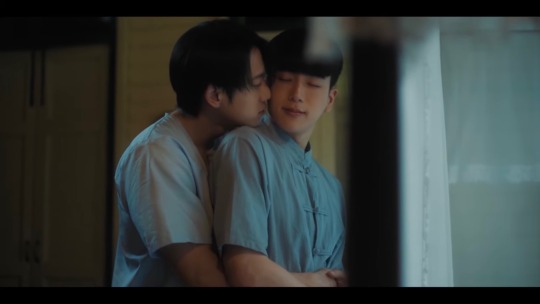
Okay pals, I got some sleep and I'm ready to dig into this finale and all its beautiful messiness. I love this show and I'm frankly a little frustrated that we got such an incomplete resolution to the (hopefully) first season when there was ample time to do it right. As ever, pacing and time and information management continue to be major weaknesses for Tee Bundit. As I said last week, the writing for this show has been undeniably messy but it's still holding together on the strength of the production and the performances and the success of some of its big themes and character arcs; that take held firm through the finale and some of the baffling choices made about where to spend our time in this final installment. So, let's dig into it!
The Long Goodbye
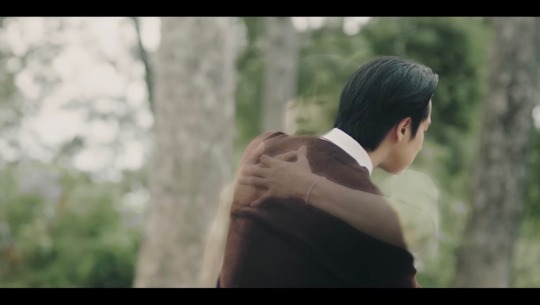
I'll say upfront that this is my biggest beef with the pacing of the finale. We spent all of last week on a long and painful goodbye for Yai and Jom, perfectly executed, but for some reason we did another 45 minutes of it this week, not so perfectly executed. While I loved the covering of the mirrors, the saddest sex scene ever (complete with sex moans running as the audio over a memory montage how dare you show!), and the pain of Yai realizing he drew the final picture and watching Jom disappear, we didn't need to retread them saying goodbye to each other over and over again for two entire hours of story time, and we didn't need a long, sappy, on the nose speech from Jom saying things we already knew. As I told @neuroticbookworm, this might be my aro showing but I found the series of repetitive emotional goodbye conversations and memory montages exhausting and not in a good way. If I were the script doctor, I would have kept the mirrors, sad sex, and Yai drawing as the start of the episode and cut the rest, moving much more quickly into the next phase of the story.
Back to the Future
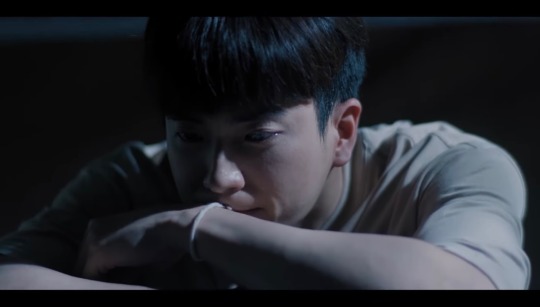
Jom returning to his present day life, trying to cope with his anguish and loneliness and adjust back into things, and further investigating the time travel mystery to figure out a way to reconnect with Yai should have been the main narrative of this episode. Instead, we got a truncated version of it that didn't have time to breath because we'd used up so much time on the above mentioned retread. For my money, Jom's devastation upon finding Yai's letter to him was the most emotionally resonant moment of the finale and the first part of the episode where I almost cried. But we had barely sunk into that feeling before it was abruptly cut short because we were out of time and Tee needed to wrap this baby up.
Eyebrow Scar Yai
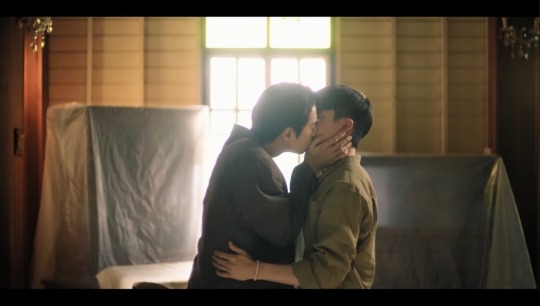
Here’s where I get actually kind of peeved, because this final (pre-credits) scene was so poorly set up and executed that to even call it a resolution is a stretch. A modern version of Yai walks into the room, asks Jom why he's crying, tells him he's been waiting for him, kisses him, and then the credits roll!
Now I've been in the tags so I know this caused confusion for anyone who has not read the novel (me too, fam!). And that's because the show had not bothered to establish:
That Yai does in fact have a modern doppelgänger
Who the heck that doppelgänger is and how he’s connected to 1928 Yai
How that doppelgänger would be able to remember Jom when no other doppelgängers in the story can remember their past lives
Based on what we know, could we piece together a reasonable theory about who this man is, how he got there, and the final pieces of the mythology that make sense of it? Sure. In fact, bookworm and I pretty much guessed exactly what the explanation for this was after watching the show, and many of the elements at play here were theorized in conversations we had last week. Book readers like @tipsyjaehyun have now confirmed the full explanation for anyone who cares to go read it.
But the show did not tell us any of this information. If you have to read the novel or have novel readers spoil you on aspects of the story that the show didn't bother to cover in order to understand the ending of the story, the execution has failed. And given the pacing notes above, there is really no reason we couldn't have gotten a better set up for this ending with Eyebrow Scar Yai (yes I know his name but no I'm not using it because the show didn't bother telling me; I am petty like that). Jom could have found this descendant during his time of processing and the ending could have hinged on us realizing this modern Yai is a reincarnation who has his past life memories intact; had we gone into a final kiss between them feeling grounded in all of that knowledge, it would have landed so much better.
Hello Commander
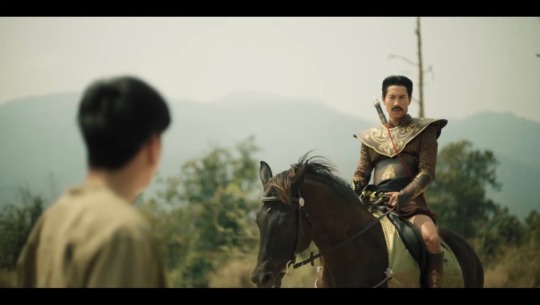
And now on to the post-credits scene, where Tee puts a plea into the universe to give him a second season so he can play around in another time period and explore what is evidently the origin of this soul tie between Jom and Yai. I chose to read this episode tag as separate from the actual season 1 narrative, and I think that was the intention given its placement. If they secure funding for a second season, this tag scene becomes the beginning of that next story, with Eyebrow Scar Yai's kiss sending Jom into another time travel adventure. If they don't we can just ignore it and pretend the pre-credits scene was the end (which is why I'm not happy it was so poorly done). I, for one, would love to see a second season to explore another time period and give Tee a chance to clean up some of this mess he has made of the mythology and season 1 resolution. Shouts to @clairedaring for reporting back from the live showing of the finale on what the possibilities are looking like there. Fingers crossed we get a continuation of this story some day!
Tagging in @waitmyturtles and @twig-tea who also have linked posts above. And shouts to @blmpff @cankersoregirl @pharawee @wanderlust-in-my-soul @italianpersonwithashippersheart @bengiyo @dragonsareawesome123 @wen-kexing-apologist @junghaesin @stuffnonsenseandotherthings @slayerkitty @respectthepetty @chickenstrangers @sunshinechay @btwinlines for posting about this show every week and making it such a fun watch despite having a small audience on here. It was a pleasure watching this with you all!
113 notes
·
View notes
Text
Do yall wanna know my actual favorite butterfly effect?
Two people fucking on a mountain indirectly lead to my favorite comic of all time, Under the Red Hood.
Let me explain.
Joseph Hugo married a woman named Sophie Trébuchet in 1797. He was a general in Napoleon's army so they moved around quite a bit. In a letter he would later write to his son, he and his wife had been on a trip on June 24th 1801 to get from one post to the next and he believed this, on the highest peaks of the Vosges Mountains, is where he believed they conceived their son, who would later become the Ocean Man and famed author Victor Hugo.
(Fun fact: Jean Valjeans prisoner number, 24601, is absolutely in reference to his believed conception date)
Victor Hugo grows up and obviously is responsible for many works, such as Les Miserables and The Hunchback of Notre-Dame and was never one to shy away from political commentary. Thus, he was exiled from France and sent to living on the Channel Islands. It was here that he wrote a novel titled The Man Who Laughs.
Like many of his works, this one does have different adaptations. One in particular came out in 1928 starring Conrad Veidt as the character Gwynplaine, or the Man Who Laughs.
Fast forward about a little over a decade later in 1940. A comic book writer comes into work to be greeted by two artists he worked with, one who did significantly less work than the others. These three men were Bill Finger, Bob Kane and Jerry Robinson.
Now the details of this meeting are...well, up in the air. Each man had their own account to it, and Bob Kane especially is the most unreliable given that he took credit for literally everything and we went over 70 years without Bill Finger getting any sort of credit to actually creating Batman. But what we do know is that there was a drawing of a playing card and a face for the joker card; and Bill Finger said, "Hey, that looks like Conrad Veidt in the Man Who Laughs."
They pushed further with that angle in making the character, a new villain for their hero; the obvious, Joker.
Some years later we get a little bit of an origin story in 1951, in the comic The Man Behind the Red Hood! (ALSO written by Bill Finger) Some college students are trying to solve this decades old case of a burglar in a red pill helmet that was called the Red Hood and trying to figure out who it was. Teaming up with Batman and Robin, they find out that the Red Hood was in fact Joker's old alias. He used to be a lab worker that was stealing from a playing card company with that alias. He was caught by Batman and threw himself into some chemical waste to escape, thus becoming the Joker.
This origin has stuck around in some form ever since. The moniker was unused for quite a long time after this, but would eventually find a new home in a different character.
See, in the 80s, Batman's second sidekick, Jason Todd, was killed off in a very brutal fashion after a fucking poll that people could call two different numbers to decide if they were going to save him or not. I will get into why I have so many frustrations with everything surrounding this story another day, but the important thing to know here is that the Joker killed Jason while Jason was trying to save his mother.
And for a good period of time there, Jason became a character that you did not bring back to life. Until they did.
A storyline running from 2005 to 2006 came into life, called Under the Hood. In it, Batman has to fight a new foe taking on the mantle of Red Hood, only to discover its Jason Todd, brought back to life from the Lazarus Pit, and taking on the mantle of the man that murdered him to go fucking murder the Joker and take control of crime in Gotham and do what he believes Bruce couldn't, all while dealing with trauma and feeling replaced.
So yeah. We wouldn't have my favorite character or story if it wasn't for Victor Hugo's parents fucking on a mountain and conceiving him there where "The elevated origin seems to have had effects on [Victor Hugo] so that [his] muse is continually sublime". That is a quote from that letter. Victor Hugo's mountain conception where he got a great muse is the reason for the Joker and Red Hood. Thanks for coming to my Ted talk.
65 notes
·
View notes